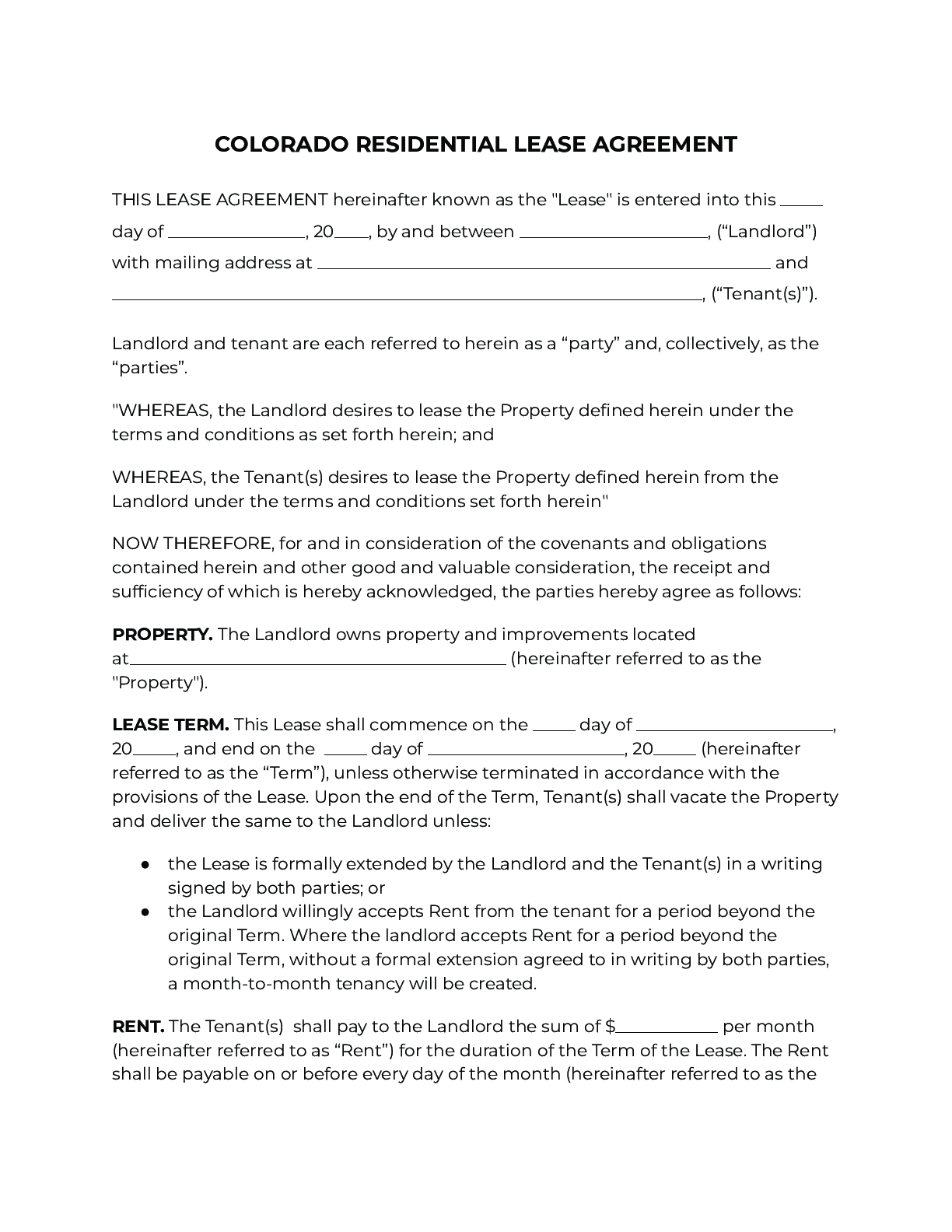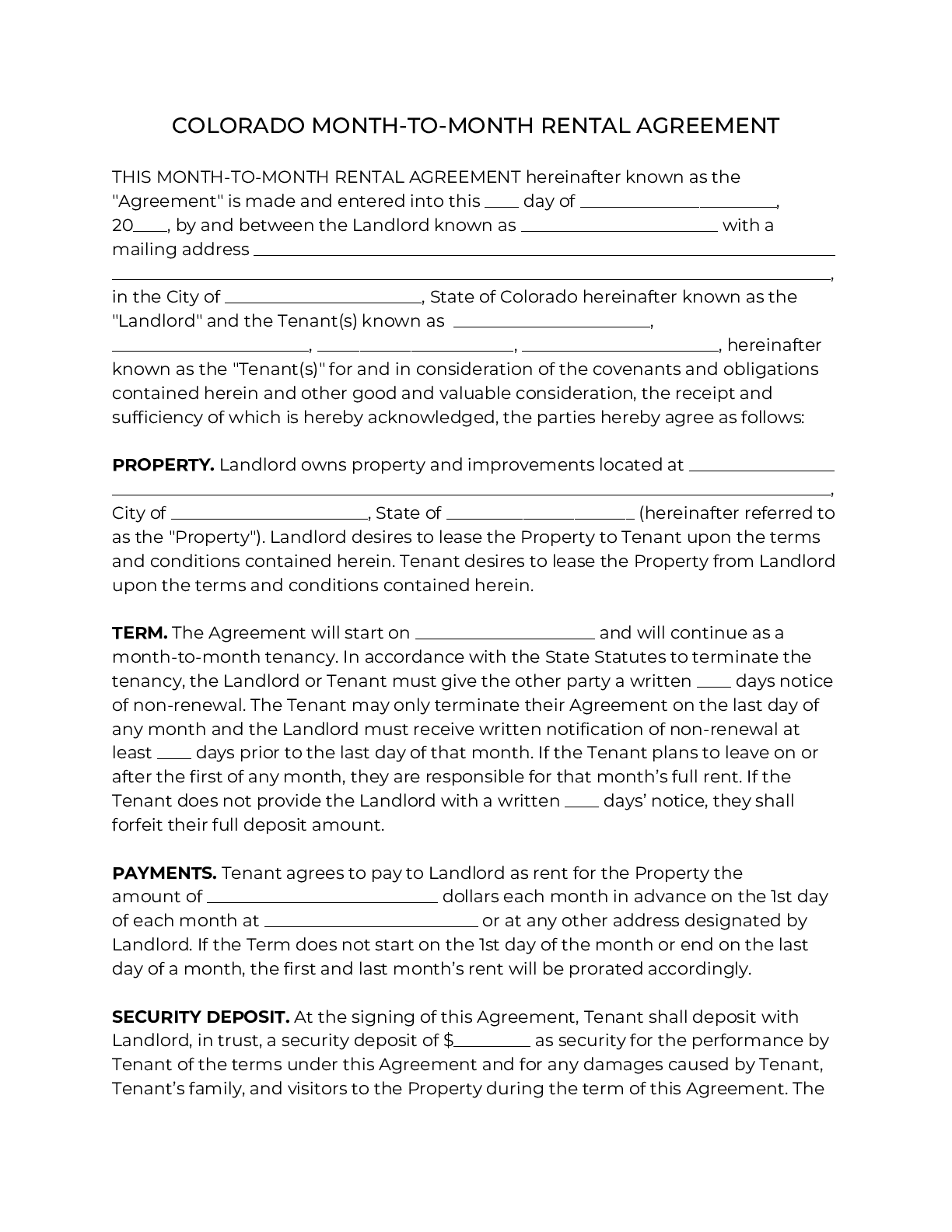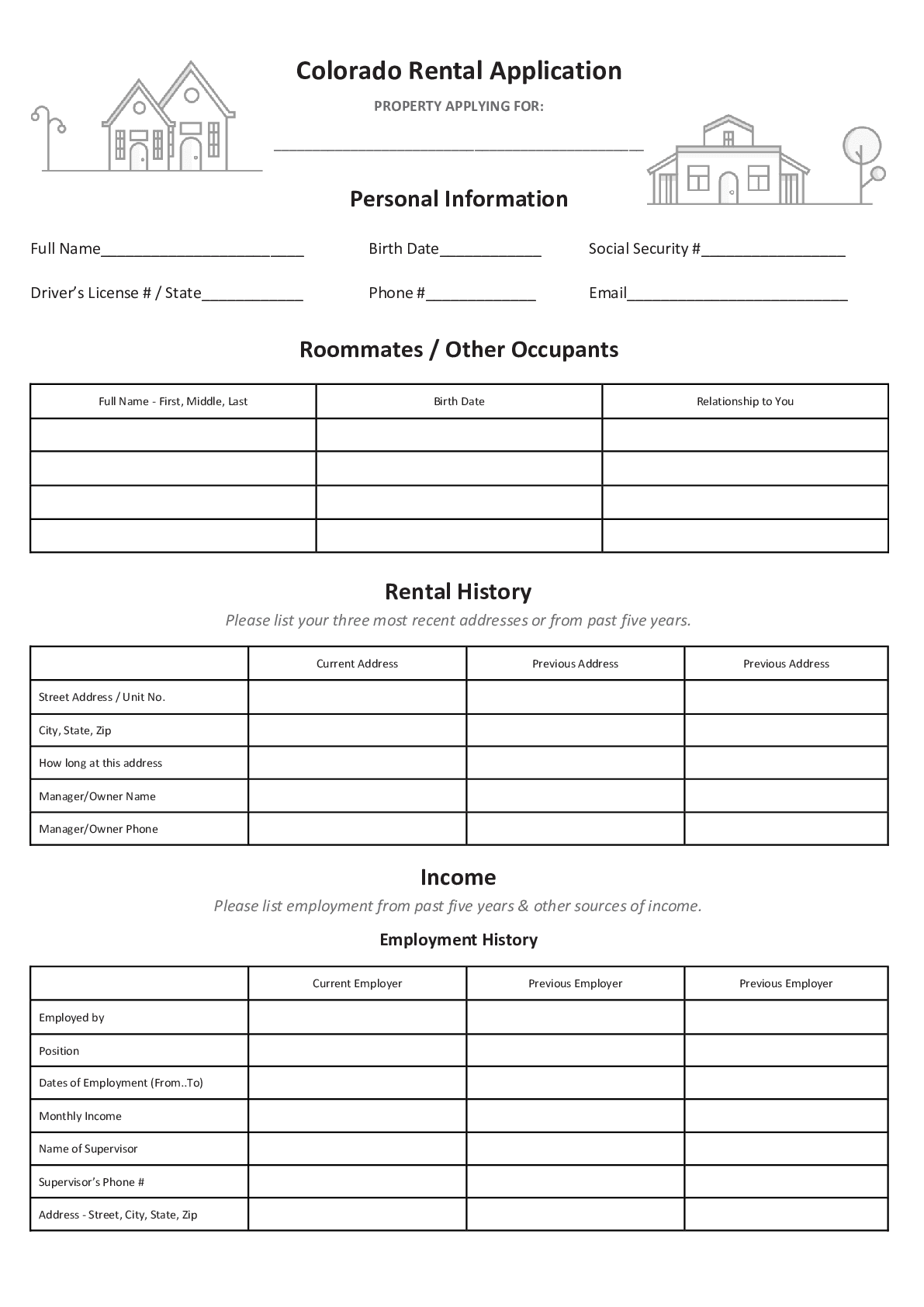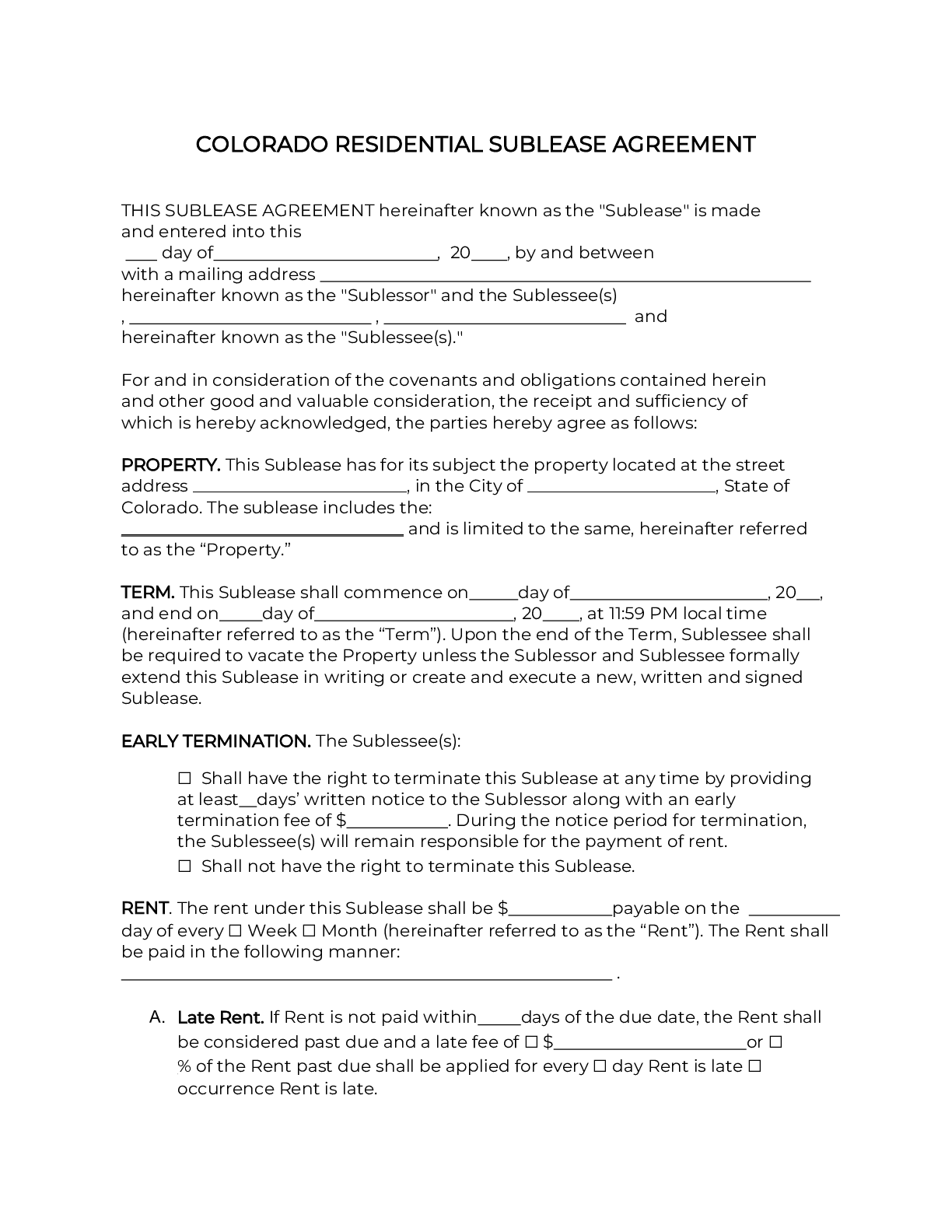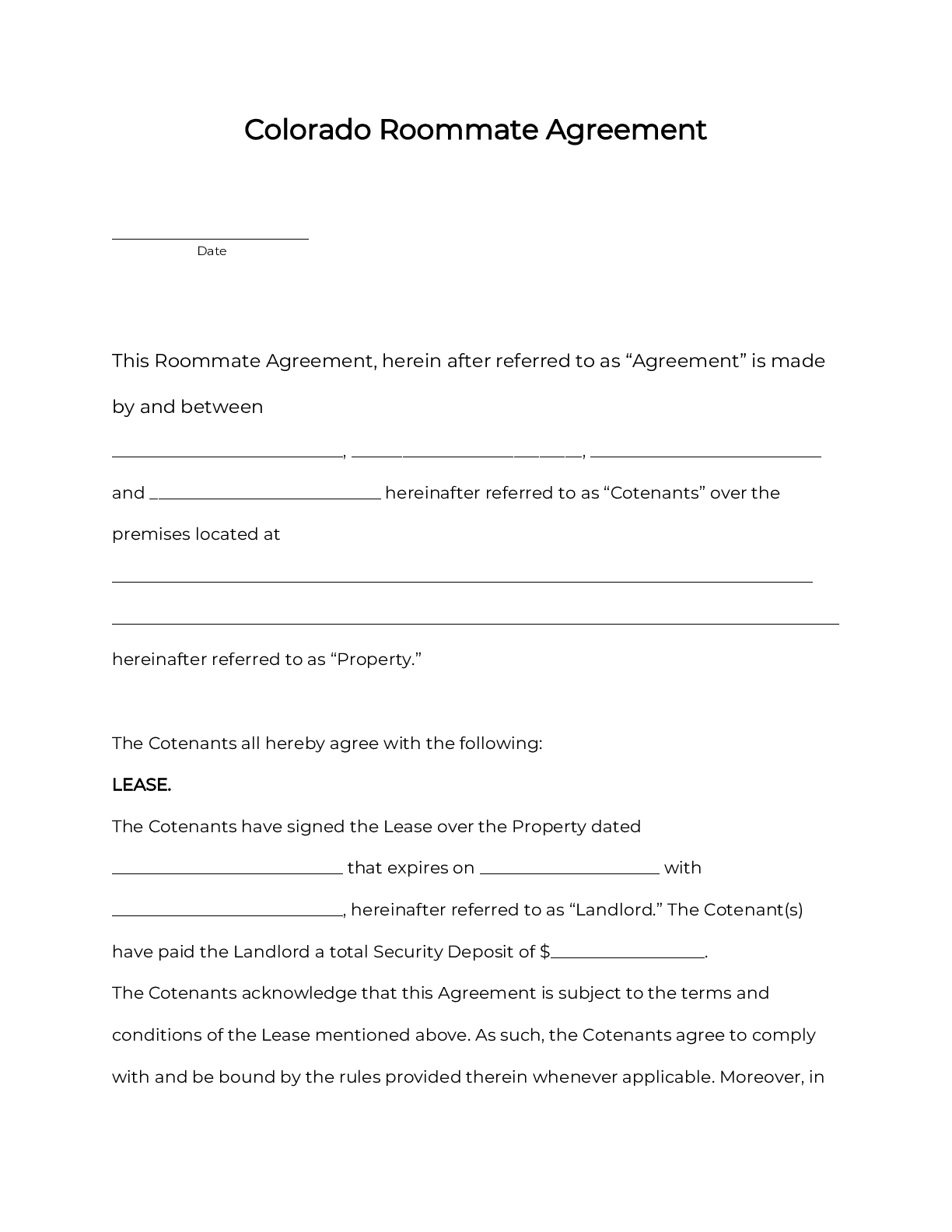A Colorado rental agreement is a legal contract between a landlord overseeing a rental property and a tenant using the property. Colorado landlord-tenant law governs and regulates these agreements.
Colorado Rental Agreement Types
A Colorado roommate agreement is a legal contract between two or more people (“co-tenants”) who share a rental property according to rules they set, including for things like splitting the rent. This agreement binds the co-tenants living together, and doesn’t include the landlord.
Common Residential Rental Agreements in Colorado
- Boulder, Colorado Model Lease Agreement – This city-provided template is in common use throughout the Boulder area. It has through coverage of local concerns, including considerations like bear-proof containers.
Colorado Required Residential Lease Disclosures
- Landlord’s Name and Address (required for all leases) – All residential leases in the state of Colorado must contain the name and address of the landlord or authorized agent, for smooth communication of legal notice. (Most leases also have information like cell phone number and email address for the parties.) When contact information changes, the landlord must provide updated information within one business day.
- Radon Gas Disclosure (required for all leases) – Colorado law requires a radon gas disclosure for all residential lease agreements. This must include a a formal statement about the dangers of radon gas, plus current information about radon testing and concentrations on the property. The disclosure is not valid unless signed by the tenant.
- Income Non-Discrimination Disclosure (required for most leases) – Colorado requires a reminder in most rental agreements that discrimination based on source of income is illegal as long as ability to pay rent is verified. Small-scale landlords operating five or fewer total rental units are exempt from this disclosure requirement.
- Lead-Based Paint Disclosure (required for some leases) – Landlords must provide an EPA-approved disclosure and informational pamphlet to tenants renting any property built before 1978.
To learn more about required disclosures in Colorado, click here.
Colorado Landlord Tenant Laws
- Warranty of Habitability – Colorado landlords can only rent out habitable property. This means providing certain basic health and safety features like heat, plumbing, electricity, and sound structural elements. Landlords must begin repairs within 24-72 hours after proper notice from the tenant, depending on the issue. Failure to repair lets a tenant sue the landlord or terminate the lease. Tenants usually aren’t allowed to repair and deduct, or withhold rent.
- Evictions – Colorado landlords may evict for rent nonpayment, lease violations, or illegal acts, among other things. Before filing eviction, landlords must serve tenants with prior notice to pay, comply, or quit, depending on the eviction type. Evictions often can take a week to a little more than a month. This can be significantly extended for property covered by the federal CARES Act, which extends the minimum eviction notice to 30 days.
- Security Deposits – Colorado caps most security deposits at two months’ rent. By default, a landlord has one month to return a tenant’s security deposit.
- Lease Termination – Colorado lets either party end a month-to-month lease with 21 days of advance notice. Terminating a fixed-term lease early requires (in most cases) active military duty, landlord harassment, uninhabitable property, or domestic abuse.
- Rent Increases and Fees – Colorado has no limit on the amount or frequency of a rent increase. The state caps late fees at $50 or 5% of the past due rent payment. The late fee may only be charged once per past due payment, and they must be be collected by the seventh calendar day after rent is late. Returned check fees are capped at $20.
- Landlord Entry – Colorado landlords may enter rental property for reasonable business purposes like maintenance and inspections. A landlord can enter at reasonable times of day using reasonable advance notice (in general at least 48 hours), unless the lease agrees otherwise. Entry to fix an emergency doesn’t require advance notice.
- Settling Legal Disputes – Colorado allows landlord-tenant disputes in its small claims courts, as long as the amount in controversy is under $7,500. Evictions are not allowed in small claims.
To learn more about landlord tenant laws in Colorado, click here.
Sources
- 1 Colo. Rev. Stat. § 38-12-801(2)
-
A written rental agreement must include a statement indicating to the tenant the name and address of the person who is the landlord or the landlord’s authorized agent. If the identity of a landlord or a landlord’s authorized agent changes, the new landlord or authorized agent, not later than one business day after such change, shall:
(a) Provide each tenant of the landlord written or electronic notice of the change; or
(b) Post the identity of the new landlord or new authorized agent in a conspicuous location on the residential premises.
Source Link - 2 Colo. Rev. Stat. § 38-12-803(2)(a)(i)
-
Source Link
Before signing a lease agreement for residential real property, the landlord shall disclose and provide in writing to the tenant the following information in a document that the tenant signs to acknowledge receipt of the disclosure:
(I) A warning statement in bold-faced type that is clearly legible in substantially the same form as is specified as follows: The Colorado Department of Public Health and Environment strongly recommends that ALL tenants have an indoor radon test performed before leasing residential real property and recommends having the radon levels mitigated if elevated radon concentrations are found. Elevated radon concentrations can be reduced by a radon mitigation professional.
Residential real property may present exposure to dangerous levels of indoor radon gas that may place the occupants at risk of developing radon-induced lung cancer. Radon, a Class A human carcinogen, is the leading cause of lung cancer in nonsmokers and the second leading cause of lung cancer overall. A landlord is required to provide the tenant with any known information on radon test results of the residential real property.
- 3 Colo. Rev. Stat. § 38-12-803(2)(a)(ii) & (2)(a)(iii)
-
Before signing a lease agreement for residential real property, the landlord shall disclose and provide in writing to the tenant the following information in a document that the tenant signs to acknowledge receipt of the disclosure:
…
(II) Any knowledge the landlord has of the residential real property’s radon concentrations, including the following information:
(A) Whether a radon test or tests have been conducted on the residential real property;
(B) The most current records and reports pertaining to radon concentrations within the residential real property;
(C) A description of any radon concentrations detected or mitigation or remediation performed; and
(D) Information regarding any radon mitigation system, including a system description and documentation, if a radon mitigation system has been installed in the residential real property; and
(III) A copy of the most recent brochure published by the department of public health and environment in accordance with section 25-11-114 (2)(a) that provides advice about radon in real estate transactions.
Source Link - 4 Colo. Rev. Stat. § 38-12-801(2.5)
-
(a) A written rental agreement must include a statement that section 24-34-502 (1) prohibits source of income discrimination and requires a non-exempt landlord to accept any lawful and verifiable source of money paid directly, indirectly, or on behalf of a person, including income derived from any lawful profession or occupation and income or rental payments derived from any government or private assistance, grant, or loan program.
(b) This subsection (2.5) does not apply to a landlord with five or fewer single-family rental homes and no more than five total rental units including any single-family homes.
Source Link - 5 Arvada Vill. Gardens L.P. v. Garate, No. 23SA34, 9 (Colo. 2023)
-
A landlord of a property covered by the CARES Act must give thirty days’ notice before filing for FED [i.e., eviction] in Colorado.Source Link
- 6 Colo. Rev. Stat. § 38-12-102.5
-
On and after August 7, 2023, a landlord shall not require a tenant to submit a security deposit in an amount that exceeds the amount of two monthly rent payments under the rental agreement.
Source Link - 7 Colo. Rev. Stat. § 13-21-109(1)
-
Any person who obtains money, merchandise, property, or other thing of value, or who makes any payment of any obligation other than an obligation on a consumer credit transaction as defined in section 5-1-301 by means of making any check, draft, or order for the payment of money upon any bank, depository, person, firm, or corporation that is not paid upon its presentment, is liable to the holder of the check, draft, or order or any assignee for collection for one of the following amounts, at the option of the holder or assignee:
(a) The face amount of the check, draft, or order plus actual damages determined in accordance with the provisions of the “Uniform Commercial Code”, title 4, C.R.S.; or
(b) An amount equal to the face amount of the check, draft, or order and:
(I) The amount of any reasonable posted or contractual charge not exceeding twenty dollars; and
(II) If the check, draft, or order has been assigned for collection to a person licensed as a collection agency pursuant to article 16 of title 5 as costs of collection, twenty percent of the face amount of the check, draft, or order but not less than twenty dollars; or
(c) An amount as provided in subsection (2) of this section.
Source Link




